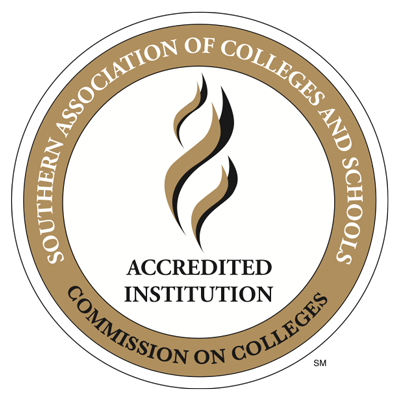
Accreditations
 The University of Memphis is accredited by the Southern Association of Colleges and
Schools Commission on Colleges (SACSCOC) to award baccalaureate, masters, educational
specialist, and doctorate. The University of Memphis also may offer credentials such
as certificates and diplomas at approved degree levels. Questions about the accreditation
of the University of Memphis may be directed in writing to the Southern Association
of Colleges and Schools Commission on Colleges at 1866 Southern Lane, Decatur, Georgia
30033-4097, by calling 404-679-4501, or by using information available on SACSCOC's
website (www.sacscoc.org).
The University of Memphis is accredited by the Southern Association of Colleges and
Schools Commission on Colleges (SACSCOC) to award baccalaureate, masters, educational
specialist, and doctorate. The University of Memphis also may offer credentials such
as certificates and diplomas at approved degree levels. Questions about the accreditation
of the University of Memphis may be directed in writing to the Southern Association
of Colleges and Schools Commission on Colleges at 1866 Southern Lane, Decatur, Georgia
30033-4097, by calling 404-679-4501, or by using information available on SACSCOC's
website (www.sacscoc.org).
State Authorization Reciprocity Agreement (SARA)
 The UofM is authorized to deliver all of our online programs to students located outside
of Tennessee through the federally recognized National Council for State Authorization
Reciprocity Agreement (NC-SARA). Forty-nine states, excluding California, are members
of NC-SARA. As a SARA institution, the UofM adheres to an established common set of
standards for offering post-secondary distance education among member states, districts
and territories.
The UofM is authorized to deliver all of our online programs to students located outside
of Tennessee through the federally recognized National Council for State Authorization
Reciprocity Agreement (NC-SARA). Forty-nine states, excluding California, are members
of NC-SARA. As a SARA institution, the UofM adheres to an established common set of
standards for offering post-secondary distance education among member states, districts
and territories.
Participation in SARA is intended to make it easier for students to take online courses offered by post-secondary institutions based in another state and to have a process for resolving student complaints. During your course of studies via UofM Global, any complaint you may have should be communicated in textual form first to your instructor. If unresolved, you may register your complaint through the University Concern or Complaint web service. For students located in California, students with complaints that are unresolved via the University Concern or Complaint process may contact the California Department of Consumer Affairs.
Authorization of distance education is a dynamic environment and prospective students should check this site often for updates. It is the student's responsibility to understand current circumstances or special requirements in their state of residence. For more information about SARA, please visit http://www.nc-sara.org/.
Professional Licensure
Important Note for Prospective Students: If you are considering an academic program
that leads to a professional license or certification in your state, it is highly
recommended that you first seek guidance from the appropriate licensing agency in
your state and from the UofM academic department offering the program to determine
if our program meets your state’s requirements. This should be done BEFORE beginning
the academic program located outside your state.
Important note for students interested in pursuing professional educator programs:
Educator licensure and certification are regulated individually by State Departments
of Education and no two are exactly alike. Students who seek admission to a UofM College
of Education online program for endorsement or initial educator certification in their
state should contact their state's Department of Education and the UofM offering department
for applicable requirements rules and regulations.
College of Arts & Sciences
The College of Arts and Sciences has determined that the curriculum for its Bachelor of Arts in Social Work, Master of Social Work, and Doctor of Social Work degree programs meets the educational requirements for licensure and/or certification, does not meet, or has not made a determination if the curricum meets the requirements, for all U.S. states and territories.
Association of Social Work Boards licensure by state
School Social Work Association of America
The College of Arts and Sciences has determined that the curriculum for its Clinical Psychology degree program meets the educational requirements for licensure and/or certification, does not meet, or has not made a determination if the curricum meets the requirements, for all U.S. states and territories. To obtain licensure, all states require the completion of supervised predoctoral practicum hours and a predoctoral internship. In addition to educational requirements for the doctoral degree, many jurisdictions require post-doctoral professional experience. Each state has specific requirements and standards for licensure. Please see licensure requirements by state as it relates to our training program for more information.
Association of State and Provincial Psychology Boards by state
The College of Arts and Sciences has determined that the curriculum for its School Psychology degree programs meet the educational requirements for licensure and/or certification, does not meet, or has not made a determination if the curricum meets the requirements, for all U.S. states and territories. Graduates of the program are eligible for Tennessee Department of Education licensure as a School Psychologist but students are encouraged to contact the state's department of education to verify the requirements, rules, and policies of the desired state. In addition, the students should obtain information with regard to any additional regulations to satisfy the state’s requirements for licensure prior to enrollment.
National Association of School Psychologists licensure by state
College of Education
The College of Education has determined that its Instruction and Curriculum Leadership degrees meet the educational requirements for licensure and/or certification in the state of Tennessee. For all other U.S. states and territories, the college has not yet made a determination whether the its Education Preparation program curriculum meets specific requirements for licensure and/or certification. Students interested in becoming certified in another state are encouraged to contact the state’s department of education to verify the requirements, rules, and policies of the desired state. In addition, the students should obtain information with regard to any additional regulations to satisfy the state’s requirements for licensure prior to enrollment. Students may review licensing boards by state for additional information.
Students may contact the ICL department for additional support: education@memphis.edu or at 901-678-2365.
The College of Education has determined that its Counseling and Counseling Psychology degrees meet the educational requirements for licensure and/or certification in the state of Tennessee. For all other U.S. states and territories, the college has not yet made a determination whether the its Education Preparation program curriculum meets specific requirements for licensure and/or certification. Students interested in becoming certified in another state are encouraged to contact the state’s department of education to verify the requirements, rules, and policies of the desired state. In addition, the students should obtain information with regard to any additional regulations to satisfy the state’s requirements for licensure prior to enrollment.
The Counseling Psychology program is accredited by the American Psychological Association (APA) Commission on Accreditation. APA accreditation is recognized in all 50 states as providing required education for psychologist license eligibility. However, individual State Boards of Psychology determine training requirements for licensure, which typically include post-doctoral training as well as examinations beyond educational requirements. Therefore, a doctoral degree from The University of Memphis alone is not sufficient to meet licensure requirements in most states. Students should confirm state licensing requirements directly with the state in which they are interested in becoming licensed.
American Counseling Association requirements by state
American School Counselor Association requirements by state
Association of State and Provincial Psychology Boards by state
College of Health Sciences
The College of Health Sciences has determined that its Dietetics and Clincial Nutrition curriculum meets the educational requirements for licensure and/or certification, does not meet, or has not determined if it meets the requirements, for all U.S. states and territories.
Effective January 1, 2024, the Commission on Dietetic Registration (CDR) will require a minimum of a master’s degree to be eligible to take the credentialing exam to become a registered dietitian nutritionist (RDN). In order to be approved for registration examination eligibility with a bachelor’s degree, an individual must meet all eligibility requirements and be submitted into CDR's Registration Eligibility Processing System (REPS) before 12:00 midnight Central Time, December 31, 2023. For more information about this requirement visit CDR's website: cdrnet.org/graduatedegree. In addition, CDR requires that individuals complete coursework and supervised practice in program(s) accredited by the Accreditation Council for Education in Nutrition and Dietetics (ACEND). Graduates who successfully complete the ACEND-accredited DPD program at the University of Memphis are eligible to apply to an ACEND-accredited supervised practice program.
Registered Dietitian certification information
Nutrition and Dietetics Technician Registered
Academy of Nutrition and Dietetics
Fogelman College of Business & Economics
The Fogelman College of Business & Economics has determined that the Accountancy programs offered in the Crews School of Accountancy (BBA and MS) meet the educational requirements to sit for the exam, does not meet the educational requirements to sit for the exam, or has not made a determination regarding the requirements, for all U.S. states and territories.
National Association of State Boards of Accountancy information by state
Loewenberg College of Nursing
The Loewenberg College of Nursing has determined that the BSN program curriculum meets the educational requirements for licensure and/or certification, does not meet the educational requirements for licensure and/or certification, or has not yet made a determination regarding the requirements, for all U.S. states and territories
The Loewenberg College of Nursing has determined that the MSN program curriculum meets the educational requirements for licensure and/or certification, does not meet the educational requirements for licensure and/or certification, or has not yet made a determination regarding the requirements, for all U.S. states and territories.
The Loewenberg College of Nursing has determined that the PhD program curriculum meets the educational requirements for licensure and/or certification, does not meet the educational requirements for licensure and/or certification, or has not yet made a determination regarding the requirements, for all U.S. states and territories.
National Council of State Boards of Nursing
School of Communication Sciences and Disorders
The School of Communication Sciences and Disorders has determined that its Audiology curriculum meets the educational requirements for licensure and/or certification, does not meet, or has not determined if it meets the requirements, for all U.S. states and territories. Please visit the Audiology website for more information about licensure, including a table with state licensure requirements for professional fields throughout the United States. Column D indicates whether the University of Memphis's programs meet each state's requirements.
The School of Communication Sciences and Disorders has determined that its Speech Language Pathology curriculum meets the educational requirements for licensure and/or certification, does not meet, or has not determined if it meets the requirements, for all U.S. states and territories. Please see the Licensure information on the Audiology website for more information about licensure, including a table with state licensure requirements for professional fields throughout the United States. Column D indicates whether the University of Memphis's programs meet each state's requirements.
American Speeh-Language-Hearing Association (ASHA) requirements by state
Student Code of Conduct and Complaint Resolution
We greatly value our student experience and urge all students to adhere to the Student Code of Conduct. Please refer to this website for student expectations and student rights: Student Accountability When an issue is brought to our attention, the UofM will take appropriate action to seek resolution. Students are encouraged to pursue the UofM's internal grievance procedures for any complaint before contacting external sources for resolution. Often, it is the case that communication with the course instructor is the most direct route to resolving issues. If an issue cannot be resolved at that level, a student may contact the academic unit for guidance. If grievances are not satisfactorily resolved by the academic unit, students may file a formal complaint through the UofM Dean of Students. If grievances are not satisfactorily resolved after an internal attempt by the University, a complaint may be filed with an agency in the student's state of residence.

